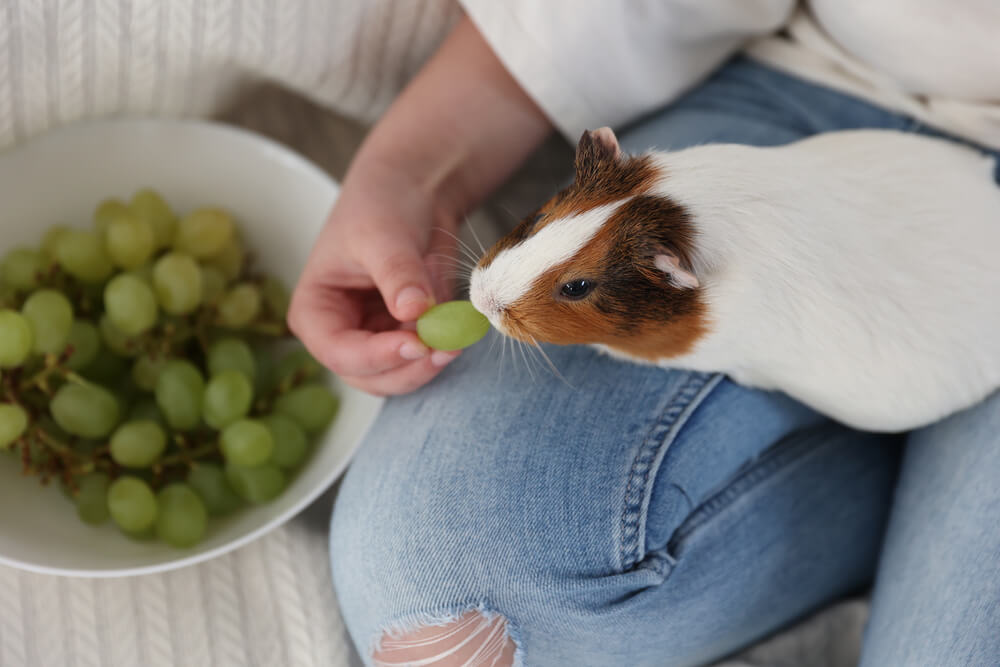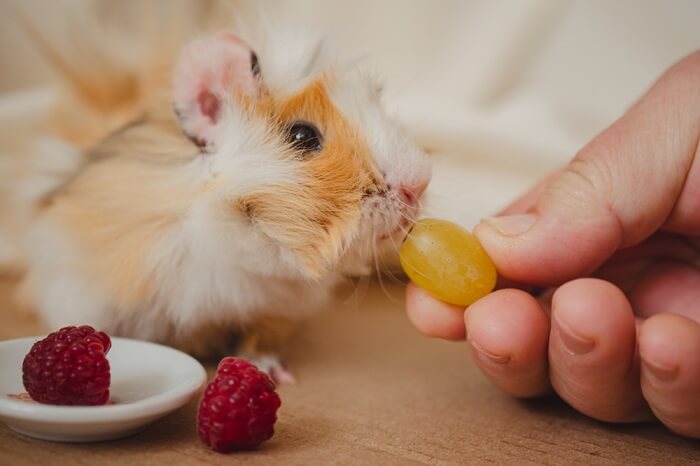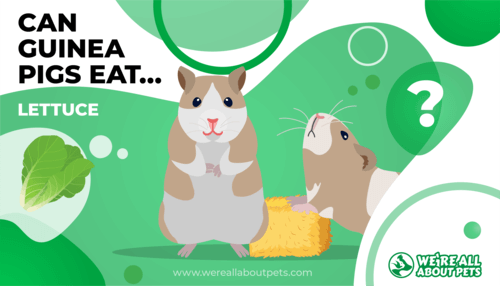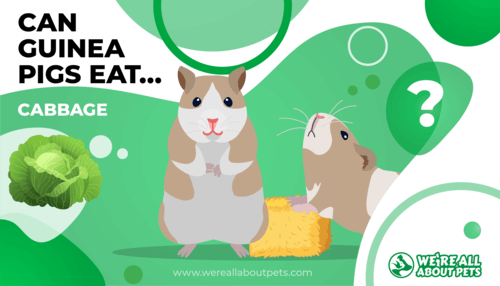Can Guinea Pigs Eat Grapes?
This page contains affiliate links. We may earn money or products from the companies mentioned in this post through our independently chosen links, which earn us a commission. Learn More

Sweet, delicious, and (at least for us humans!) good for you, grapes are a favorite treat. You’re not alone if you’ve been wondering whether guinea pigs can eat grapes.
As it turns out, grapes can be good for guinea pigs but you need to be very careful about which type of grapes you offer your pet, and you need to ensure that you don’t overdo it. When giving grapes to a guinea pig, the concept of “too much of a good thing” certainly applies.
Keep on reading to learn more about grapes for guinea pigs.
Grape Nutrition Stats
You probably know that grapes are pretty high in sugar, even though they’re great for your health.
A one-cup serving of fresh grapes offers about:
- 104 calories
- 5 g carbohydrates
- 5 g fiber
- 1 g protein
- .2 g fat
Grape Nutritional Facts

Grapes – particularly purple and red varieties – are brimming with powerful antioxidants that protect cells from damage and premature aging.
In general though, a one-cup serving of grapes contains:
- 288 mg potassium
- 3 mg vitamin C
- .1 mg vitamin B6
- 0.1 mg manganese
- 0.1 mg riboflavin
- .1 mg thiamine
- .2 mg copper
- 22 mcg vitamin K
Can Guinea Pigs Have Grapes?
The topic of grapes for guinea pigs is hotly contested since feeding too many grapes at once can cause problems. But so long as you’re careful and feed your guinea pig grapes only occasionally, they’re a fun treat that your pet will go crazy for.
Start by choosing seedless grapes only, or removing the seeds from any grapes that you plan to give your guinea pig.
The sharp, small seeds in grapes present a choking hazard and you don’t want to accidentally put your pet in harms way.
Since grapes are usually treated with chemicals to prevent insect damage, it’s really important to wash them thoroughly. If you’re eating organic grapes (and offering them to your guinea pig!) you’re a step ahead of the game but you’ll still want to give them a good rinse to remove dirt and other contaminants that might be lurking.
Are Grapes Good For Guinea Pigs?
Yes! Grapes contain lots of vitamin C, which is one reason why they’re such a nice natural treat for your guinea pig. Since guinea pigs don’t manufacture their own vitamin C, it’s up to us as their caretakers to ensure that they’re getting enough.
You’re probably offering plenty if your guinea pig is eating a good commercial guinea pig diet, but it doesn’t hurt to provide snacks that contain vitamin C!
All of the other vitamins, minerals, and antioxidants in grapes will help your guinea pig stay healthy, too. Keep in mind though, that grapes are high in sugar – so it’s important to offer only small amounts.
Do Guinea Pigs Like Grapes?
Most guinea pigs love grapes, but keep in mind that each little cavy is an individual and some guineas never develop a taste for grapes. Don’t take it personally if your pet doesn’t like grapes – offer them something different instead! You’ll find an entire list of healthy, natural guinea pig treats at the end of the page.
How Many Grapes Can A Guinea Pig Eat?

That’s a great question and we’re glad you asked! Here’s how much celery a to feed your guinea pig:
| Age | Amount |
| Baby guinea pig | None |
| Adult guinea pig | 2 medium-sized grapes |
Anytime you offer a new food to your guinea pig, be sure to give just a small amount, and then keep an eye out for diarrhea over the next 12 hours or so. Only give half a grape to your guinea pig the first time they try this treat.
If no diarrhea develops, go ahead and offer them a whole grape next time and then progress to the full amount.
How Often Can A Guinea Pig Eat Grapes?
It’s important to note that you should only give grapes to a guinea pig about 2 to 3 times per week, and not on the same day that you offer other foods that are high in sugar or acid.
Too many sweets can make your guinea pig turn their nose up at healthy, essential foods, so you’ll want to be really careful not to overdo it – and too many acidic foods (including grapes) can give your guinea pig mouth sores, so it’s very important to keep these treats to a minimum.
The Correct Diet is Important
A guinea pig’s natural diet is made up mostly of grass and leafy greens, so it’s important to give your guinea pig the diet that nature intended!
Your guinea pig needs fresh hay all around – they’ll use it to nest in, and they’ll dig tunnels underneath, nibbling as they go. Keep a good supply of Timothy hay on hand to help your guinea pig stay healthy!
Remember to keep your guinea pig’s water bottle full of fresh water, too. We often don’t think of water as part of our diet, but it’s essential!
Besides fresh hay and water, a guinea pig’s daily intake should include:
- Vitamin C enriched guinea pig pellets (check the label to see how much to offer since different guinea pig food brands have different recommended serving sizes)
- Approximately one cup of fresh food per day – mostly leafy green veggies, a few little crunchy veggies, and a small amount of fruit
What Are Other Healthy Alternatives To Grapes In A Guinea Pig’s Diet?

Guinea pigs can eat veggies and fruits of almost all kinds. Nutritious leafy greens are favorites!
When you’re deciding what to feed your guinea pig, be sure to get information of all of the foods you’re considering. It’s important not just to feed the right foods, but to provide the right amount.
Here’s a long list of veggies guinea pigs like:
- cilantro
- basil
- mint
- parsley
- romaine
- carrots
- carrot tops
- beets
- beet tops
- swiss chard
- asparagus
- arugula
- spinach
- rocket
- cabbage
- butter lettuce
- green beans
- pumpkin
- cucumber
- sweet potato
- zucchini
- summer squash
- tomato
- cauliflower
- brussels sprouts
- broccolini
- escarole
- endive
- bok choy
- yu choy
- bell peppers
While you’ll want to ensure that your guinea pig’s daily diet consists mostly of Timothy hay and a balanced guinea pig food with added vitamin C, it’s a very good idea to provide an ever-changing mixture of different veggies and the occasional fruit, just to ensure that your guinea pig gets all the vitamins and minerals they need.
Giving your guinea pig grapes – just a small amount – is a nice way to keep things interesting and ensure good nutrition at the same time!
Frequently Asked Questions
Are grapes safe for guinea pigs?
Yes, so long as you wash the grapes and offer the right amount, grapes are good for guinea pigs.
Can grapes make my guinea pig sick?
Since too much sugar isn’t good for guinea pigs, you’ll want to limit the amount of sweet food you offer – and this includes grapes. Too many grapes can make your guinea pig sick – and even if they don’t show signs of illness, too much sugar can lead to obesity, which in turn can shorten your guinea pig’s life span and cause other problems.








